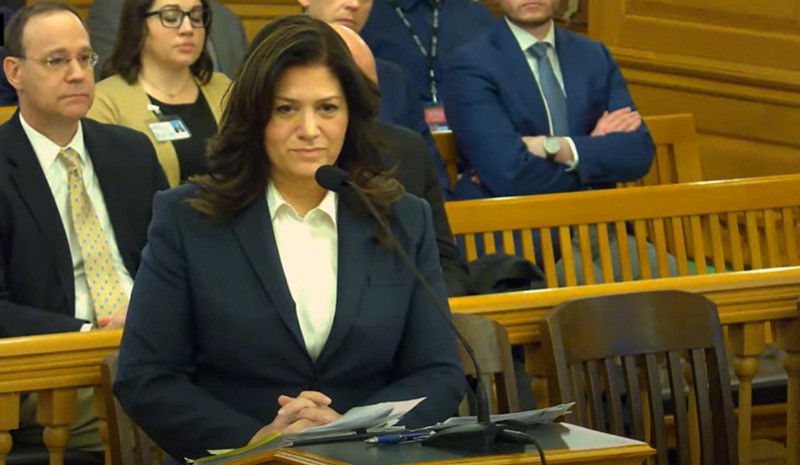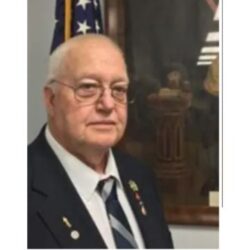By Tim Carpenter, Kansas Reflector
TOPEKA, Kan. — The Kansas Senate unanimously confirmed Kansas Court of Appeals nominee Rachel Pickering despite alarms set off by Republicans about judicial criticism leveled against her decisions as appellate defense counsel in a 15-year-old criminal case.
The Republican-dominated Senate voted to make Pickering, a Shawnee County District Court judge, the first Hispanic on the state Court of Appeals.
The old case and glass-ceiling issues could become footnotes to a larger political effort by conservatives in the Kansas Legislature to build momentum for an amendment to the Kansas Constitution requiring Senate confirmation of nominees to the Kansas Supreme Court. In 2013, then-Gov. Sam Brownback signed a bill adopting the federal model of Senate advice and consent for Court of Appeals nominees. To strip Kansas governors of power to make direct appointments to the Supreme Court, however, would require amending the constitution.
Sen. Virgil Peck, a Republican from Havana in southeast Kansas, echoed praise from Republicans and Democrats for Pickering’s experience as a judge, prosecutor and defense attorney. He joined a chorus of GOP colleagues who denounced Gov. Laura Kelly for not providing the Senate Judiciary Committee with information about the Court of Appeals’ criticism of Pickering’s approach to appeal of a criminal conviction.
“I was disappointed, frustrated. I could use several adjectives, but will stop there,” Peck said. “Is this a one-time experience? I don’t know. My conspiracy mind would tend to say, ‘No.’ Probably happened before, just didn’t learn about it.”
Peck, pivoting to the deeper political issue, said the experience with Pickering’s nomination raised the possibility Kelly swept under the rug unflattering information about the governor’s three appointees to the Supreme Court. In 2020, Kelly appointed Keynen Wall, Evelyn Wilson and Melissa Standridge to the state’s highest court from among finalists selected by a nominating commission. In November’s statewide election, Kansans voted to retain all three justices by two-thirds majorities.
“We have three individuals on the Supreme Court that were appointed by our current governor,” Peck said. “We did not have an opportunity to weigh in as legislators, as senators, on whether they should sit on the highest court in the state of Kansas.”
Fellow Republican Sen. J.R. Claeys of Salina said the Senate Judiciary Committee discovered in the court record justification for questioning Pickering’s qualificiations to serve on the Court of Appeals. He said the governor was aware of the controversy, but didn’t share that with the Senate committee. The governor’s lack of disclosure demonstrated the value of Senate confirmation for members of the judicial branch, he said.
Different perspectives
Sen. Ethan Corson, a Fairway Democrat, attorney and member of the Senate Judiciary Committee, said he was a strong supporter of Pickering’s nomination.
He said questions raised by senators about her decisions 15 years ago to abandon a line of appeal regarding evidence against the accused was relevant to consideration of her nomination to the Court of Appeals. Those issues should be looked at in context of a career as a criminal defense and prosecuting attorney as well as years working on appellate cases before the Supreme Court and Court of Appeals, he said.
“I do think Judge Pickering, in terms of background, reputation, depth of experience is really in a class by herself,” Corson said.
He said debate about Pickering during the Senate committee’s deliberations foreshadowed resurgence of a proposed constitutional amendment that narrowly fell short of the needed two-thirds majority in the Senate during the 2022 session. It approved by the House and Senate and by statewide voters, the amendment would prevent governors from making direct appointments to the Supreme Court. Instead, governors would nominate individuals to the Supreme Court for the final decision made by the Senate.
Opponents of the change believe placing the Senate in charge of Supreme Court confirmations would undercut the executive branch’s role in the judiciary. Republicans have maintained House and Senate majorities over Democrats since 1993.
“I think this is an argument you will see going forward for bringing back the same amendment that failed last year,” Corson said. “The result would be politicization of the courts at a time when we desperately need to try to turn down the temperature and depoliticize things.”
House Democratic leader Vic Miller, a Topeka attorney and former municipal judge, said Senate Republicans thought they ferreted out a smoking gun in the Pickering nomination. He said the Pickering controversy was intended to persuade Kanas votes that governors couldn’t be trusted to make appointments to the Supreme Court.
“In fact,” Miller said, “their inability to comprehend the very complicated nuances of this legal situation is a clear illustration of why politics do not belong in the confirmation process. The Senate has no business confirming our justices, as evidenced by their politically-driven witch hunt that ultimately ended with a unanimous vote.”
Senate President Ty Masterson, an Andover Republican, proposed in 2022 a constitutional amendment designed to end influence of the Supreme Court nominating commission and repeal the merit-based selection process inserted into the Kansas Constitution in 1958.
Masterson and other GOP lawmakers said membership on the nine-member nominating commission was tilted toward members of the Kansas Bar Association. He said the current vetting process for applicants to the Supreme Court failed to provide “the people any real input in the judicial selection process,” led to a seven-member Supreme Court that issued “extreme” decisions on abortion law and ran afoul of the nation’s tradition of government checks and balances.
In 2019, the Senate dismissed a resolution making constitutional changes necessary so the process of reviewing Supreme Court nominations mirrored state law guiding Senate confirmation of nominees to the Court of Appeals. The House passed a comparable measure in 2016, but not by the two-thirds majority required to advance constitutional amendments.
Since 2014, the Kansas Senate confirmed nine of 10 nominees to the Court of Appeals. The lone rejection — twice —was Carl Folsom, who devoted much of his legal career to work as a federal and state public defender. His second rejection led Kelly to declare “legislative leaders are still putting partisan politics ahead of their constitutionally mandated duties.”
Under this Senate confirmation process, Brownback placed two people on the Court of Appeals. The first, Caleb Stegall, was controversial because he was general counsel in the governor’s office. It triggered a rebuke from the House Minority Leader Paul Davis of Lawrence, who disagreed with Brownback’s nomination of “well-connected, partisan pals.” Brownback later appointed Stegall to the Supreme Court.
Six of Kelly’s nominees to the 14-member state Court of Appeals — all women — have survived Senate review since 2019.
The backstory
In August, Kelly nominated Pickering to fill a vacancy on the Court of Appeals. The governor had previously appointed her to the Shawnee County District Court in 2019. Pickering’s legal career included work as an appellate defender, public defender, assistant district attorney and assistant solicitor general.
Pickering had argued 35 cases before the Supreme Court, 40 in front of the Court of Appeals and authored more than 300 legal briefs. As an appellate defender, Pickering worked on felony cases from all 105 Kansas counties. She was responsible for criminal cases as a public defender and a prosecutor in Shawnee County. She also was involved in felony cases and federal appeals in the office of the state attorney general.
On Jan. 17, Pickering was called before the Senate Judiciary Committee to discuss her nomination to the Court of Appeals. Pickering and the governor’s office were informed in advance by Republican Sen. Kellie Warren, the committee’s chairwoman and an attorney from Lenexa, the committee would explore Pickering’s work for the Kansas Appellate Defender’s Office on behalf of a convicted felon.
On appeal, the Court of Appeals had concluded Pickering’s approach in that case was “objectively unreasonable” and raised the issue of ineffective counsel.
Pickering, who appeared for a second day of questioning by the Senate Judiciary Committee, said courts traditionally deferred on issues of strategy to appellate counsel. To do otherwise, she said, would result in judges or justices engaging in “Monday morning quarterbacking.” She said the experience of being doubted by the Court of Appeals led her to participate in “best practice” sessions to help other attorneys working in the appellate arena.
“There wasn’t an effort to hide this at all,” Pickering said. “Appellate practice can be harsh. It helps if you can lead the way with others. You have to be humble when you teach that continuing legal education.”
She said no disciplinary case was brought against her. Issues raised in the criminal appeal were later overturned and the Court of Appeals decision in that criminal case was no longer considered “good law,” she said.
Warren, the Senate Judiciary Committee’s chairwoman and an unsuccessful candidate last year for attorney general, said a larger question was Kelly’s decision to keep the Senate in the dark. Warren praised Pickering for meeting individually with senators and speaking with the committee about her recollection of the appellate case.
“The issue is not the candidate, but the process,” said Senate Vice President Rick Wilborn, R-McPherson. “There was a failure that could have been disasterous. I think this is an example of the confirmation process working. I’m disappointed the governor’s office failed to provide information in a timely manner. I want to see the process improved going forward.”
When the dust settled, the Senate Judiciary Committee voted unanimously to endorse confirmation of Pickering to the Court of Appeals. The full Senate’s final vote: 37-0.
“Rachel is a committed public servant as an attorney and judge,” Kelly said. “Her experience in nearly every area of criminal litigation will provide her with great insight as she serves the Kansas Court of Appeals.”























